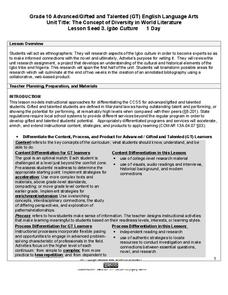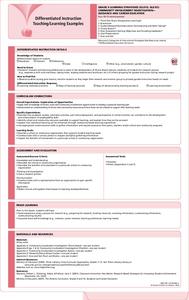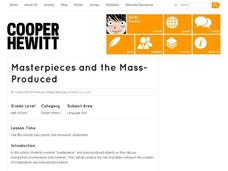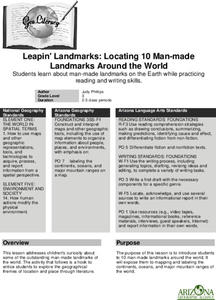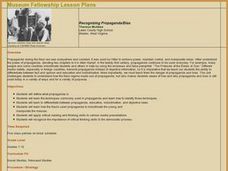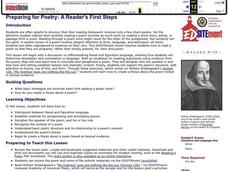Maryland Department of Education
The Concept of Identity Lesson 4: The Psychological Approach
Readers apply Sigmund Freud's theories of the unconscious mind and the psychological approach to literary criticism to analyze and evaluate the relationship between two characters in A Separate Peace.
Maryland Department of Education
The Concept of Diversity in World Literature Lesson 3: Igbo Culture
What cultural concepts must readers understand in order to connect to Things Fall Apart? As part of their study of Chinua Achebe’s novel, class members research Nigeria and the Igbo culture to create a collaborative, web-based, annotated...
Maryland Department of Education
The Concept of Identity Lesson 2: The Historical/Biographical Approach
"How does our environment shape our identity?" After researching biographical information about John Knowles and considering how these experiences are reflected in A Separate Peace, class members consider the strengths and weaknesses of...
Maryland Department of Education
The Concept of Identity Lesson 5: Motivation - Maslow's Hierarchy of Needs
Maslow's Hierarchy of Needs provides the lens class members use to analyze and evaluate the motivations of the characters in Sylvia Plath's "Initiation" and scenes from Mean Girls. Readers then select a character from A Separate...
Maryland Department of Education
The Concept of Diversity in World Literature Lesson 13: Unit Culmination - Symposium
To conclude a unit on the concept of diversity in world literature, class members conduct a symposium on "African Literature in Global Perspectives." In order to earn a spot on the panel, individuals craft an original thesis that...
Maryland Department of Education
The Concept of Diversity in World Literature Lesson 9: Debating Imperialism
To gain an understanding of Imperialism, class members read Rudyard Kipling's poem, "The White Man's Burden" and Mark Twain's essay, "To the Person Sitting in Darkness." Groups compare these perceptions of non-white cultures with the...
EduGAINs
Community Involvement Investigation— Guidance and Career Education
Not only do extracurricular activities look good on a college application, they can foster important life skills. From sports to volunteering to employment, extracurricular activities can inform your learners' experiences later in life....
EduGAINs
Data Management
Using a carousel activity, class members gain an understanding of the idea of inferences by using pictures then connecting them to mathematics. Groups discuss their individual problems prior to sharing them with the entire class. The...
Maryland Department of Education
The Concept of Diversity in World Literature Lesson 12: Author's Purpose - Yeats and Achebe
Is there such a thing as fate/luck? Can one fight destiny? As part of their study of Chinua Achebe's purpose in writing Things Fall Apart, class members answer these questions from Achebe's point of view and then from William Butler...
Curated OER
Pythagoras' Theorem
Learners are introduced to the Pythagoras' Theorem and its history, proofs and practice in application. Students find perimeters, areas and volume of everyday objects. Learners state and explain the theory.
EduGAINs
Introduction to the Great Depression—Canadian and World Studies
Ah, the classic business cycle model: recession, depression, recovery, prosperity. And then there was the Great Depression. Groups investigate the economic conditions that led to and social movements of the 1920s that great out of the...
Curated OER
Masterpieces and the Mass-Produced
Students examine "masterpieces" and mass-produced objects as they discuss humankind's inventiveness and creativity. They also analyze the role of problem solving in the creation of masterpieces and mass-produced items.
Gwinnett County Public Schools
Analysis of the Tuck Everlasting and The Birchbark House Text Exemplars
Looking to introduce some text-based questions into your ELA lessons? Practice the kinds of skills the Common Core demands with the seven text-based questions and the essay prompt provided here. Designed to be a three-day lesson, day one...
EduGAINs
Guidance and Career Education: Pathways— Goal Setting and Action Planning
Sooner or later, the learners in your class are going to move on to college and the professional world. Help them organize their goals with a project designed for groups, which prompts them to examine entry points and next steps for...
Curated OER
Leapin' Landmarks: Locating 10 man-made landmarks around the world
Third graders engage in a lesson which addresses their curiosity about some of the outstanding people-made landmarks of the world. They explore the geographical themes of location and place through literature.
Curated OER
Recognizing Propaganda/Bias
Middle and high schoolers examine the uses of propaganda during the Nazi era. Using examples of propaganda used by Hitler, they discuss how it changed the thinking and ideas of people exposed to it. In groups, they identify how and why...
Curated OER
Living and Non-Living Things
Take a walk and observe living and non-living things on the way. Young scientists practice making valuable observations and draw the details. You could require that your students complete a T chart of living and non-living things and...
Public Schools of North Carolina
Democratic Republic of Congo - Map Skills
Work on your map skills with a packet of activities about the river basins in the Democratic Republic on Congo. Learners study the maps provided before answering the geography questions and writing an acrostic poem about the region.
Virginia Department of Education
Complex Numbers
Build on your class' understanding of real numbers as they begin working with complex numbers. Pupils begin with an exploration of i and the patterns in the powers of i. After developing a definition for i, they simplify complex number...
New York State Education Department
TASC Transition Curriculum: Workshop 2
Flipped classrooms and online tools killed the chalkboard! An awesome, hands-on technology workshop asks teachers across all content areas. to examine model lessons, become familiar with research, and explore tech tools they can...
Florida Department of Health
Understanding the Risk of Substance Abuse Unit
Teenage brains are different! Understanding that the teenage brain is still developing and thus more impacted by substance abuse is the key concept in a three-lesson high school health unit. Participants learn about how the brain and...
Curated OER
Preparing for Poetry: A Reader's First Steps
Students examine denotation and connotation in language, and paraphrase a poem. They read and analyze a sonnet by iam Shakespeare, analyze the attitude and tone, paraphrase a poem, and create a thesis about a poem based on textual evidence.
Curated OER
Shadows & Light, Science & Puppetry
Lights, shadows, action, and inquiry await your artistic scientists. They explore the way light travels, absorbs, reflects, and transmits through shadow play. They create folktale-inspired shadow puppets, explore the science of light,...
Curated OER
Cover Up: Tools for Integrating Math and Engineering
Blend art, adolescent snacking habits, and math to create new cereal boxes. Secondary learners review scale drawings. They use this information to construct cereal boxes to scale and will compare their creation to the original product to...



